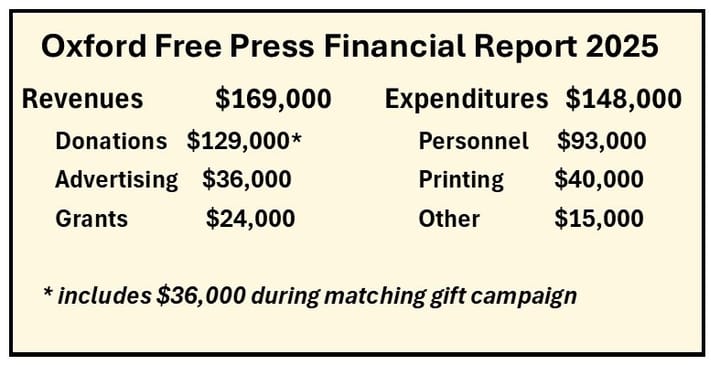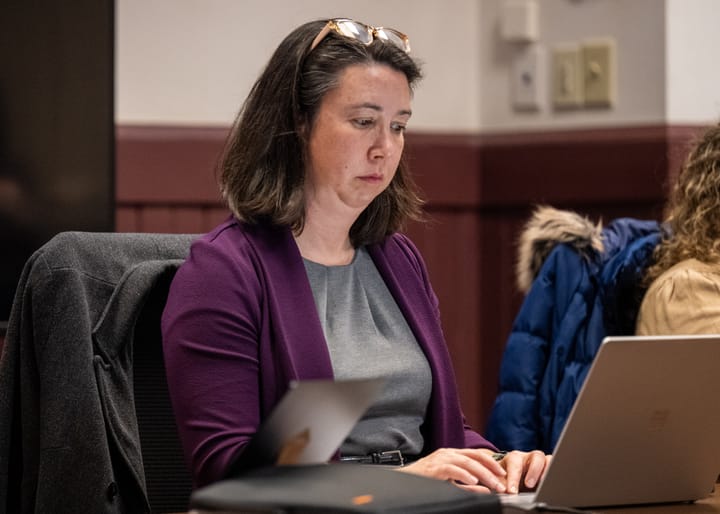Talawanda reviews budget losses, state report card
The Talawanda School District will lose about $242,000 over two years as a result of tax exemptions approved by the Butler County Commission.

The Talawanda School District (TSD) will lose about $242,000 as a result of Ohio House Bill 96 Piggyback Property Tax Exemptions.
Talawanda Schools Treasurer Shaunna Tafelski told the Talawanda Board of Education during a regular meeting Oct. 9 the provision allows county commissioners to double the current Homestead Tax Exemption and Owner-Occupancy Tax Credit. These expended credits would result in reduced property tax collections for the school from current operating levies.
Butler County Commissioners voted to approve the Homestead Tax Exemption expansion in the 2025 tax year, which has resulted in a $242,000 reduction to the district split between Fiscal Year 2026 and FY27, or a loss of $121,000 each year for two years. But Tafelski said she is assuming this is a one-time reduction, meaning the commission will need to vote annually for future tax years to be included.
If the commission also votes to approve a 2.5% Owner-Occupancy Tax Credit rollback, the school district will risk losing roughly $542,000 total.
Tafelski said in an email to the Oxford Free Press, if school districts have bond levies in Butler County, homeowners who do not qualify for the Homestead Tax Exemption will be picking up the additional funding burden, as bond levies are set amounts school districts must collect to pay debt service payments.
Three property tax levy options are no longer available for school districts to employ as a result of Ohio legislators overruling Gov. Mike DeWine’s veto as of Oct. 1. This includes the fixed-sum emergency levy to generate a set amount of money every year, the substitute emergency levy, and the combined school district income tax and fixed-sum property tax levy allowing districts to combine two levy types.
Tafelski said in the email, the district does not currently use any of these levy options and has not in the past.
Still, she said, “With the burden being placed so heavily on local community members to pay more for public education, why would they limit how public school districts can generate these much-needed funds?”
In Tafelski’s five-year financial forecast presented to the board during its meeting, she showed state funding continuing to be “flat” for FY27 through FY30, while enrollment in Talawanda Schools is dropping. The school district has 173 less students in FY26 than in FY20 when headcount enrollment was 2,885 students, although Tafelski said staffing levels are projected to stay flat.
Tafelski said losing enrollment pushes the school district’s funding deeper onto the state’s “guarantee.” The guaranteed funding for Talawanda Schools from Ohio based on the basic cost of educating a student (about $1,100), is over $3.5 million.
Tafelski said, as enrollment drops, Talawanda Schools would lose funding if not for the minimum level of funding guaranteed by Ohio, which is “saving our hides right now.”
“If legislation gets rid of the guarantee, we’re in trouble,” she said, adding this has been a conversation for decades.
At the same time, she pointed out a proposed ballot issue to abolish property taxes in Ohio.
If that were to happen, Tafelski told the board, “This will not just affect school districts, but townships, city services such as fire, police and libraries as well. If approved there currently isn't a plan B in place to generate this much-needed revenue.”
Losing property taxes would also require Talawanda Schools to make cuts or pass new levies to maintain student instruction, Tafelski said in her presentation, which could become harder as levy options are narrowed.
The estimated general fund revenues for FY26, according to Tafelski, includes 75% local sources and 25% state sources. Local sources include property taxes, income taxes, tuition, interest and Medicaid reimbursements.
The total general fund estimated revenues for FY26 are $46,475,448, with expenditures remaining below revenues, maintaining a positive cash balance throughout the five-year forecast.
Report card
Talawanda Schools received four out of five stars overall on its 2024-25 academic year report card from the Ohio Department of Education and Workforce, using school-reported data like state testing scores and graduation rates to measure effectiveness.
According to the district’s results, Talawanda Schools exceeded state standards in its students’ achievement on state testing and progress over academic years, closing educational gaps for students and ensuring its students graduate.
The district’s current graduation rate is 98.7% for those who graduated in four years, meaning Talawanda has the highest graduation rate in Butler County.
The district met state standards in college, career, workforce and military readiness, as well, which was measured by how prepared students are once they graduate.
Still, the district received two stars in the early literacy component of its report card, which measures reading improvement and proficiency for students in kindergarten through third grade, leaving Talawanda in sixth place in the county.
Board member Pat Meade said, “I think it’s easy for us as people to see that one area where we’re not doing as well as, and focus on that and not celebrate the good things.”
“I have faith that next year, when we come back, we will see a change in that because when our staff is focused on something, things get better.”
Director of Teaching and Learning Stephanie Aerni told the board the district will continue to work on K-3rd grade literacy by training staff to address areas of need and expanding resources for students. She also thanked the board for hiring additional reading intervention teachers last year.
“This is where a lot of our focus is … is looking at exactly how we can target these students,” she said.
Public discussion
During the public participation portion of the meeting, two parents told the board they are concerned about a book in their children’s classrooms.
Katie Benge said “Drama,” by Raina Telgemeier, contains “sexually explicit content” that is “not appropriate for elementary students,” noting that the book was in her child’s elementary school classroom.
She said the book, which depicts two boys kissing on one of its pages, “goes against the rights that we the parents should be able to teach them.”
“This also goes against my religious values and beliefs,” Benge said, asking the board to implement an immediate policy to review all elementary school books in libraries addressing adolescent romantic relationships and sexual identity themes.
The American Library Association lists “Drama” at number seven in its list of the “Top 100 Most Frequently Challenged Books 2010-2019.”
Talawanda Schools Director of Communications Holli Hansel told the Oxford Free Press in an email she believes “Drama” was donated to the school district, although she is unsure of its origin.
“The libraries and classroom collections within Talawanda School District offer a wide range of books and reading materials that reflect diverse topics, perspectives, and characters,” Hansel said in the email.
“Talawanda School District adheres to all applicable laws and district policies (PO#9130) regarding curriculum and reading materials,” she said. “While students are encouraged to select books for independent reading, we recognize that parents may prefer their child not read certain titles. Parents have the right to guide their child’s independent reading choices and may also request that their child be excused from specific assigned readings within the curriculum.”
Hansel said the school district encourages parents and guardians to contact their school’s administrators with questions or concerns about reading materials or curriculum. She said educators can work with families regarding independent reading selections if there are titles parents do not want their children to read.
“We know and understand that there are differences in both reading level and maturity among the student body in TSD and we are always happy to work with families to assist with developmentally appropriate reading materials,” Hansel said in the email. “Please also know that we understand that families may also supply reading materials from home, or from another local library where the selection can be made under the supervision of the parent or guardian.”




